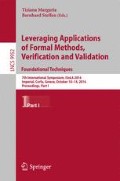Abstract
Today’s software systems are becoming increasingly distributed and decentralized and it would be important to have them adapt autonomously to dynamically changing, open-ended environments. Often the nodes of such systems have their own individual properties and objectives; interactions with other nodes or with humans may lead to the emergence of unexpected phenomena. We call such systems collective adaptive systems. Examples for collective adaptive systems are robot swarms, smart cities, voluntary peer-to-peer clouds as well as socio-technical systems and the internet of things.
Access this chapter
Tax calculation will be finalised at checkout
Purchases are for personal use only
References
Alrahman, Y.A., De Nicola, R., Loreti, M.: Programming of CAS systems by relying on attribute-based communication. In: Margaria, T., Steffen, B. (eds.) ISoLA 2016, Part I, LNCS, vol. 9952, pp. 539–553. Springer, Cham (2016)
Margheri, A., Nielson, H.R., Nielson, F., Pugliese, R.: Towards static analysis of policy-based self-adaptive computing systems. In: Margaria, T., Steffen, B. (eds.) ISoLA 2016, Part I, LNCS, vol. 9952, pp. 554–569. Springer, Cham (2016)
Hennicker, R.: A calculus for open ensembles and their composition. In: Margaria, T., Steffen, B. (eds.) ISoLA 2016, Part I, LNCS, vol. 9952, pp. 570–588. Springer, Cham (2016)
De Angelis, F.L., Di Marzo Serugendo, G.: Logic fragments: coordinating entities with logic programs. In: Margaria, T., Steffen, B. (eds.) ISoLA 2016, Part I, LNCS, vol. 9952, pp. 589–604. Springer, Cham (2016)
Poplavko, P., Kahil, R., Socci, D., Bensalem, S., Bozga, M.: Mixed-critical systems design with coarse-grained multi-core interference. In: Margaria, T., Steffen, B. (eds.) ISoLA 2016, Part I, LNCS, vol. 9952, pp. 605–621. Springer, Cham (2016)
Mehlhase, A., Jähnichen, S., Czwink, A.: A library and scripting language for tool independent simulation descriptions. In: Margaria, T., Steffen, B. (eds.) ISoLA 2016, Part I, LNCS, vol. 9952, pp. 622–638. Springer, Cham (2016)
Bures, T., Hnetynka, P., Krijt, F., Matena, V., Plasil, F.: Smart coordination of autonomic component ensembles in the context of ad-hoc communication. In: Margaria, T., Steffen, B. (eds.) ISoLA 2016, Part I, LNCS, vol. 9952, pp. 642–656. Springer, Cham (2016)
Ciancia, V., Latella, D., Massink, M., Paskauskas, R., Vandin, A.: A tool-chain for statistical spatio-temporal model checking of bike-sharing systems. In: Margaria, T., Steffen, B. (eds.) ISoLA 2016, Part I, LNCS, vol. 9952, pp. 657–673. Springer, Cham (2016)
Zoń, N., Gilmore, S., Hillston, J.: Rigorous graphical modelling of movement in collective adaptive systems. In: Margaria, T., Steffen, B. (eds.) ISoLA 2016, Part I, LNCS, vol. 9952, pp. 674–688. Springer, Cham (2016)
Vassev, E., Hinchey, M.: Integration and promotion of autonomy with the ARE framework. In: Margaria, T., Steffen, B. (eds.) ISoLA 2016, Part I, LNCS, vol. 9952, pp. 689–703. Springer, Cham (2016)
Jähnichen, S., Wirsing, M.: Adaptation to the unforeseen: do we master our autonomous systems? - Panel introduction. In: Margaria, T., Steffen, B. (eds.) ISoLA 2016, Part I, LNCS, vol. 9952, pp. 639–641. Springer, Cham (2016)
Di Marzo Serugendo, G.: Engineering adaptivity, universal autonomous systems, ethics and compliance Issues. In: Margaria, T., Steffen, B. (eds.) ISoLA 2016, Part I, LNCS, vol. 9952, pp. 714–719. Springer, Cham (2016)
Vassev, E.: Safe artificial intelligence and formal methods. In: Margaria, T., Steffen, B. (eds.) ISoLA 2016, Part I, LNCS, vol. 9952, pp. 704–713. Springer, Cham (2016)
Author information
Authors and Affiliations
Corresponding author
Editor information
Editors and Affiliations
Rights and permissions
Copyright information
© 2016 Springer International Publishing AG
About this paper
Cite this paper
Jähnichen, S., Wirsing, M. (2016). Rigorous Engineering of Collective Adaptive Systems Track Introduction. In: Margaria, T., Steffen, B. (eds) Leveraging Applications of Formal Methods, Verification and Validation: Foundational Techniques. ISoLA 2016. Lecture Notes in Computer Science(), vol 9952. Springer, Cham. https://doi.org/10.1007/978-3-319-47166-2_37
Download citation
DOI: https://doi.org/10.1007/978-3-319-47166-2_37
Published:
Publisher Name: Springer, Cham
Print ISBN: 978-3-319-47165-5
Online ISBN: 978-3-319-47166-2
eBook Packages: Computer ScienceComputer Science (R0)

